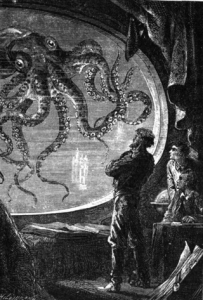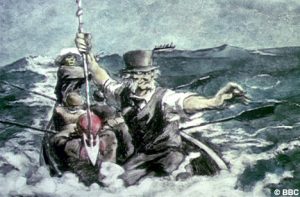Marine Epics: Lessons in performance vs. arousal
-
20,000 Leagues Under The Sea

“It was a squid of colossal dimensions, fully eight meters long. It was traveling backward with tremendous speed in the same direction as the Nautilus. It gazed with enormous, staring eyes that were tinted sea green. Its eight arms (or more accurately, feet) were rooted in its head, which has earned these animals the name cephalopod; its arms stretched a distance twice the length of its body and were writhing like the serpentine hair of the Furies. You could plainly see its 250 suckers, arranged over the inner sides of its tentacles and shaped like semispheric capsules. Sometimes these suckers fastened onto the lounge window by creating vacuums against it. The monster’s mouth–a beak made of horn and shaped like that of a parrot–opened and closed vertically. Its tongue, also of horn substance and armed with several rows of sharp teeth, would flicker out from between these genuine shears. What a freak of nature! A bird’s beak on a mollusk! Its body was spindle-shaped and swollen in the middle, a fleshy mass that must have weighed 20,000 to 25,000 kilograms. Its unstable color would change with tremendous speed as the animal grew irritated, passing successively from bluish gray to reddish brown.What was irritating this mollusk? No doubt the presence of the Nautilus, even more fearsome than itself, and which it couldn’t grip with its mandibles or the suckers on itsarms. And yet what monsters these devilfish are, what vitality our Creator has given them, what vigor in their movements, thanks to their owning a triple heart!”
Sheer chance had placed us in the presence of this squid, and I didn’t want to lose this opportunity to meticulously study such a cephalopod specimen. I overcame the horror that its appearance inspired in me, picked up a pencil, and began to sketch it.” -
Moby-Dick or The Whale
“His three boats stove around him, and oars and men both whirling in the
eddies; one captain, seizing the line-knife from his broken prow, had dashed at
the whale, as an Arkansas duellist at his foe, blindly seeking with a six inch
blade to reach the fathom-deep life of the whale. That captain was Ahab. And then it was, that suddenly sweeping his sickle-shaped lower jaw beneath him, Moby Dick had reaped away Ahab’s leg, as a mower a blade of grass in the
field. No turbaned Turk, no hired Venetian or Malay, could have smote him with more seeming malice. Small reason was there to doubt, then, that ever since that almost fatal encounter, Ahab had cherished a wild vindictiveness against the whale, all the more fell for that in his frantic morbidness he at last came to identify with him, not only all his bodily woes, but all his
intellectual and spiritual exasperations. The White Whale swam before him as the
monomaniac incarnation of all those malicious agencies which some deep men feel eating in them, till they are left living on with half a heart and half a
lung. That intangible malignity which has been from the beginning; to whose
dominion even the modern Christians ascribe one-half of the worlds; which the
ancient Ophites of the east reverenced in their statue devil;–Ahab did not
fall down and worship it like them; but deliriously transferring its idea to the
abhorred white whale, he pitted himself, all mutilated, against it. All
that most maddens and torments; all that stirs up the lees of things; all truth
with malice in it; all that cracks the sinews and cakes the brain; all the
subtle demonisms of life and thought; all evil, to crazy Ahab, were visibly
personified, and made practically assailable in Moby Dick. He piled upon the
whale’s white hump the sum of all the general rage and hate felt by his whole
race from Adam down; and then, as if his chest had been a mortar, he burst his
hot heart’s shell upon it.”
Marine Animal Systems

